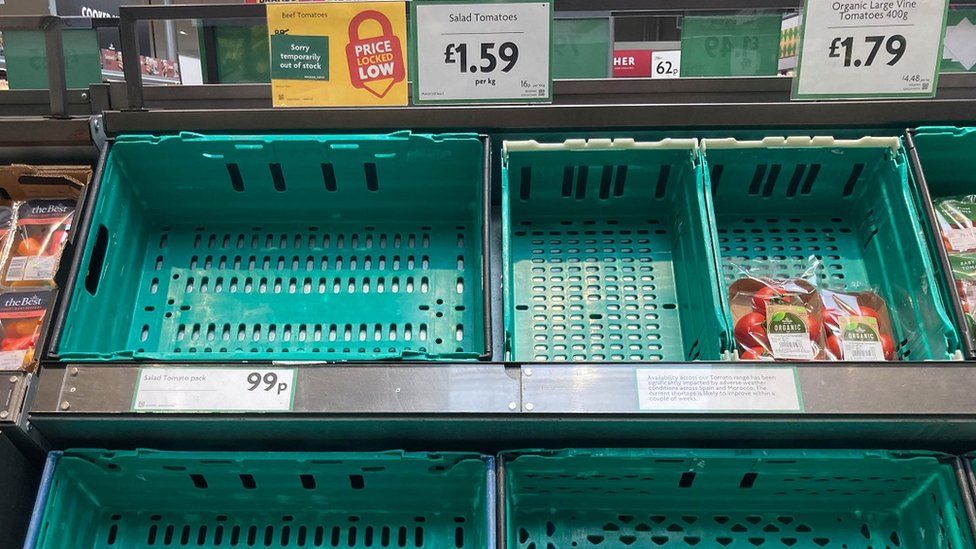Industry sources predict that there will continue to be a shortage of some fruits and vegetables for several weeks, including tomatoes.
Social media has recently been flooded with images of bare supermarket shelves.
Poor harvests in southern Europe and North Africa were attributed by the British Retail Consortium (BRC) to "difficult weather conditions.".
Production has been impacted by rising energy costs.
The supply of some crops has been hampered for months by extreme weather.
For example, the supply of onions, which are typically grown in the summer and stored, was significantly impacted by the European heatwave last year. As a result, costs have dramatically increased.
The supply of crops like tomatoes, peppers, and cucumbers has recently been impacted by unusually cold weather in southern Spain.
A sizeable portion of what the UK consumes during this season typically originates from that area.
Normally, the backup plan would be to purchase more food from Morocco, but flooding there has hampered production, and storms have caused ferries to be postponed or cancelled.
The Netherlands is another major supplier of fresh produce, where fruit and vegetables are grown in heated greenhouses. However, growers have put off planting crops due to the high cost of energy, which has made the overall situation worse.
Similar issues are affecting British farmers.
According to Nigel Jenney, CEO of the Fresh Produce Consortium, which is made up of about 700 businesses, "there have been a variety of individual factors.". "Weather, fuel prices, packaging and shipping expenses, and energy costs. ".
According to him, the extreme weather patterns in Spain and Morocco have been very disruptive. The industry, he claims, is making every effort to offer the best produce possible.
The disruption was anticipated to last for "a few weeks," according to Andrew Opie, director of Food and Sustainability at the British Retail Consortium.
Supermarkets are "adept at managing supply chain issues and are collaborating with farmers to ensure that consumers have access to a variety of fresh produce," the expert continued.
But other companies have also been impacted.
Supplying restaurants, cafes, and schools in the south west of England, The Heritage Fine Food Company in Wiltshire said locating tomatoes had grown "incredibly challenging.".
The company claimed that peppers have been failing to ripen and that cucumber supplies are "incredibly limited.".
Many UK companies have contracts to buy set amounts of imported goods, claims managing director Ken Mortimer. But when they need more, they must purchase it on the open market, and the costs have been unaffordable.
Anecdotal evidence indicates that the UK has borne the brunt of the shortages, with other European nations showing little evidence of empty shelves.
The problem of extremely high prices, however, seems to be felt widely across the continent.
According to industry sources, the UK may be suffering as a result of lower domestic production, more complicated supply chains, and a price-sensitive market. They claim that Brexit will probably not be a factor.
The main effects of the new border controls on imported fruits and vegetables won't be felt until January, but imports from Morocco, which is not in the EU, are already subject to border checks.
Brexit is not the issue, according to Mr. Mortimer, at least not in my opinion.
For a response, the BBC has also gotten in touch with business organization the Irish Business and Employers Confederation (IBEC).







